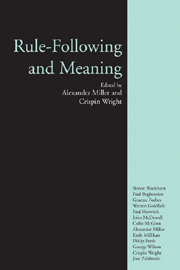Book contents
- Frontmatter
- Contents
- Acknowledgements
- The Contributors
- 1 Introduction
- 2 Skepticism and Semantic Knowledge
- 3 The Individual Strikes Back
- 4 Wittgenstein on Following a Rule
- 5 Wittgenstein, Kripke and Non-Reductionism about Meaning
- 6 Kripke on Wittgenstein on Rules
- 7 Critical Notice of Colin McGinn's Wittgenstein on Meaning
- 8 Meaning and Intention as Judgement Dependent
- 9 The Rule-Following Considerations
- 10 The Reality of Rule-Following
- 11 Truth Rules, Hoverflies, and the Kripke–Wittgenstein Paradox
- 12 Kripke on Wittgenstein on Normativity
- 13 Meaning, Use and Truth
- 14 Kripke's Normativity Argument
- Guide to Further Reading
- Index
14 - Kripke's Normativity Argument
- Frontmatter
- Contents
- Acknowledgements
- The Contributors
- 1 Introduction
- 2 Skepticism and Semantic Knowledge
- 3 The Individual Strikes Back
- 4 Wittgenstein on Following a Rule
- 5 Wittgenstein, Kripke and Non-Reductionism about Meaning
- 6 Kripke on Wittgenstein on Rules
- 7 Critical Notice of Colin McGinn's Wittgenstein on Meaning
- 8 Meaning and Intention as Judgement Dependent
- 9 The Rule-Following Considerations
- 10 The Reality of Rule-Following
- 11 Truth Rules, Hoverflies, and the Kripke–Wittgenstein Paradox
- 12 Kripke on Wittgenstein on Normativity
- 13 Meaning, Use and Truth
- 14 Kripke's Normativity Argument
- Guide to Further Reading
- Index
Summary
I INTRODUCTION
In Wittgenstein on Rules and Private Language, Kripke presented an argument to the effect that there can be no facts as to what someone means by a linguistic expression. In this argument, a central role is played by the contention that meaning is a normative notion. Some of the most popular accounts of what meaning facts consist in are rejected on the grounds that they fail to accommodate the normative character of meaning. This aspect of Kripke's dialectic plays a crucial role in his rejection of dispositional accounts of meaning, and it is rightly perceived as undermining, if successful, currently fashionable information theoretic accounts of semantic notions. Assessments of its success vary widely. Whereas for some writers the normative character of meaning constitutes an insurmountable obstacle for dispositional accounts, advocates of the information theoretic program have generally failed to acknowledge that their proposals are invalidated by this aspect of the notion. This debate rests largely on a tacit consensus on how Kripke's normativity argument should be interpreted. My main goal in this paper is to question this consensus. I shall argue that a certain widespread interpretation of the argument is incorrect, as it misrepresents the nature of the constraint that Kripke takes the normativity of meaning to impose on a successful account of meaning facts.
It will simplify matters to focus on a specific kind of meaning facts, namely the facts that are supposed to determine which objects satisfy a predicate, as meant by a speaker at a time.
- Type
- Chapter
- Information
- Rule-Following and Meaning , pp. 274 - 294Publisher: Acumen PublishingPrint publication year: 2002
- 2
- Cited by



